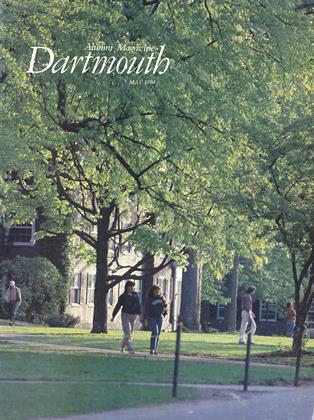You may have heard about the athletic extravaganza the College threw in Boston late last month for "The Wearers of the Green." It was a celebration honoring Dartmouth athletes far and wide who had made significant contributions to Dartmouth athletics either as team captains, All-Americans, Olpians, or world champions. They were there at the Westin Hotel by the hundreds to share memories of times gone by and to add by their presence yet another dimension to the Dartmouth experience. For your correspondent, who was little more than a scrub on the athletic fields of this grand College, it was an opportunity to rub elbows with the real McCoy, to see up close the Bill Mortons, the Judy Geers, the Billy Kings who made their marks in the record books and perhaps more important, in so many other unrecorded ways which only their teammates, coaches, and trainers will ever know about.
In years past, John Sloan Dickey customerily ended his graduation remarks with, "And now, Men of Dartmouth, the word is once again 'solong,' for in the Dartmouth fellowship, there is no parting." I've never forgotten that closing line, but over the last twelve months, it has taken on far richer meaning for me as that fellowship has broadened to include men and women I never had the opportunity to meet before because our days on the Hanover Plain didn't coincide, or if they did, we belonged to different clubs, lived in different dorms, or maybe had no classes together. What I'm getting at here is that one of the best things about being back at Dartmouth has been getting to know so many outside of my class whom I would never have had the chance to know save by some quirk of fate where we ended up side by side on the same flight to Ft. Lauderdale or Florence, or in a buffet line at a Dartmouth club meeting.
Though it may seem ridiculously naive, my previous concept of that fellowship was both static and narrow; I suppose it meant little more than images of a bunch of skin-headed guys ranging in age from 17 to 21 who partied together and sang together and rough-housed in dorms and fraternities (we never called them "frats"), guys who griped about Saturday classes and "mystery meat" at Thayer, and who one day found themselves marching up the boards in front of Baker and then down with a diploma in hand. There was the shock of recognition that we had wasted too much time and that most of what we had studied would need buttressing by more classes and experience. Fellowship, in short, had meant the Dartmouth I had known as an undergraduate and only that. But as events such as "The Wearers" suggest, there's more to the Dartmouth fellowship than what might well have been the four best years of our lives.
 View Full Issue
View Full Issue
More From This Issue
-
 Feature
FeatureFeast and Famine
May 1984 By Laurie Kretchmar '84 -
 Feature
FeatureThe Granite of New Hampshire
May 1984 By Debbie Schupack '84 -
 Feature
Feature"The Highest-Ranking Woman in American History"
May 1984 By Shelby Grantham -
 Cover Story
Cover StoryA Return to Dartmouth
May 1984 By Brian W. Ford '67 -
 Class Notes
Class Notes1959
May 1984 By William G. Long -
 Class Notes
Class Notes1956
May 1984 By Clement B. Malin
Lettter from the Editor
-
 Lettter from the Editor
Lettter from the EditorLetters
June 1945 -
 Lettter from the Editor
Lettter from the EditorLetter from Oxford
April 1949 By CHARLES G. BOLTE '41 -
 Lettter from the Editor
Lettter from the EditorExcelsior!
APRIL 1984 By Douglas Greenwood -
 Lettter from the Editor
Lettter from the EditorDouble Vision
MARCH • 1985 By Douglas Greenwood -
 Lettter from the Editor
Lettter from the Editor'Round the Girdled Earth
December 1944 By H. F. W. -
 Lettter from the Editor
Lettter from the Editor'Round the Girdled Earth
February 1945 By H. F. W.

